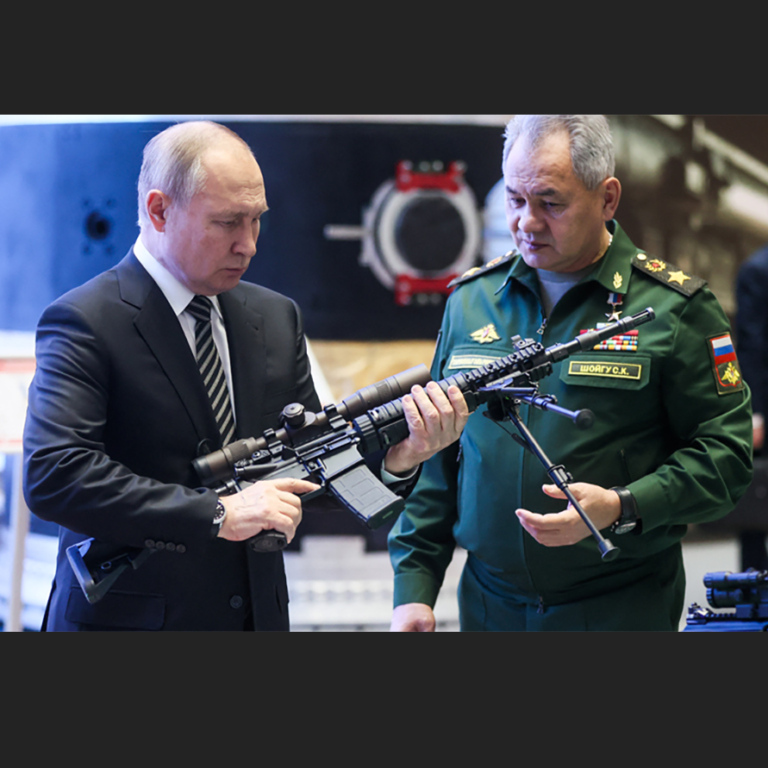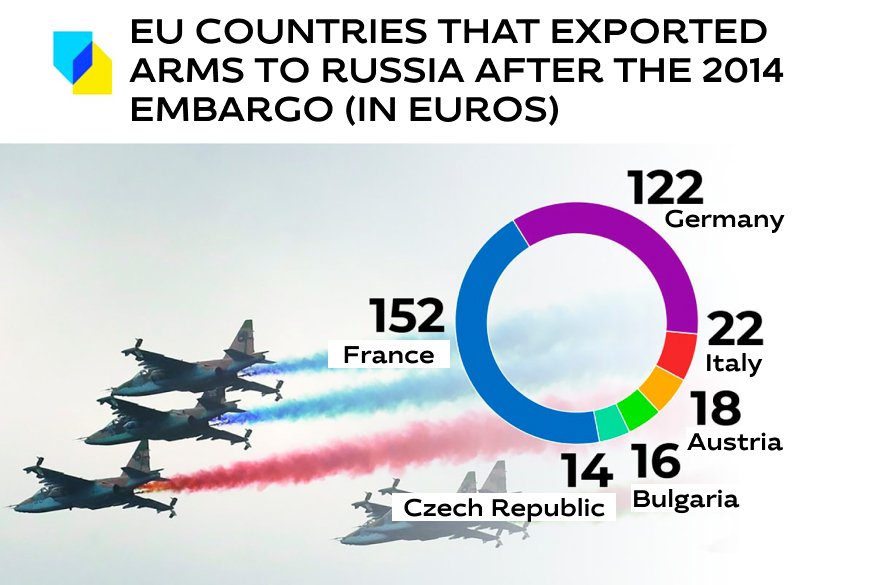
The world started talking loudly about the Russo-Ukrainian war only with the beginning of a full-scale invasion. However, this war began in 2014, when Russia annexed Crimea and initiated hostilities in eastern Ukraine, which lasted for eight years. The West’s weak reaction and procrastination with harsh sanctions have unleashed Russia’s power. An Investigate Europe investigation published on March 17, 2022, found that EU countries exported weapons to Russia after the 2014 embargo and at least until 2020.
According to the official Working Party on Conventional Arms Exports (COARM), a third of the European Union’s member states exported weapons to the Russian Federation. From 2015 to 2020, at least 10 EU member states exported weapons totaling 346 million euros to Russia. France, Germany, Italy, Austria, Bulgaria, the Czech Republic, Croatia, Finland, Slovakia, and Spain sold Russia “military equipment” that could include missiles, bombs, torpedoes, cannons and missiles, ground vehicles, and ships.

An embargo full of loopholes
In 2014, the EU Council decided to ban the sale of weapons to Russia due to Russia’s occupation of Crimea and the proclamation of separatist republics in the Donbas. Thus, the EU Council “condemned the unprovoked violation by the Russian Federation of the sovereignty and territorial integrity of Ukraine and called on the Russian Federation to immediately withdraw its armed forces to the areas of their permanent deployment.”
“Direct or indirect sale, supply, transfer or export of weapons and related material assets of all types to Russia by citizens of member states or from the territories of Russia to the Member States is prohibited, regardless of whether they originate from their territory or not,” the document of this decision says.

Since 2014, EU member states have issued more than a thousand licenses and general permits for weapons operations. Only about a hundred were refused. Thus, these countries took advantage of a legal loophole in EU regulations to continue supplying weapons to Russia.

Photo: Guillaume Horcajuelo/Pool for Reuters
France
The largest arms exporter among European countries during these years was France. This country sold Russia military equipment worth 152 million euros. Since 2015, France has granted permission to export military equipment belonging to the category of “bombs, missiles, torpedoes, explosive charges”, lethal weapons, as well as “image processing equipment”, aircraft with their components, and “aircraft lighter than air vehicles”.
French exports also include thermal imagers for more than a thousand Russian tanks, navigation systems, infrared detectors for fighter jets, and combat helicopters. This equipment is now also available among the ground vehicles, fighters, and helicopters of Russia operating on the Ukrainian war front.
In 2014, the French authorities still permitted to send chemical and biological weapons, anti-riot equipment, radioactive materials, related equipment, components, and materials to Russia. The number of licenses issued by France increased dramatically in 2015, right after the embargo.

Photo: Mikhail Metzel
Germany
Germany exported 121.8 million euros worth of military equipment to Russia, which is 35% of all European arms exports to Russia. For the most part, these supplies included icebreakers and rifles, and vehicles for “special protection”. German exports are designated as “for dual-use”, i.e., for both civilian and military purposes.

Italy
Italy ranks third among European arms exporters to Russia. It sold 22.5 million euros worth of military equipment to Russia between 2015 and 2020.
Italy signed its first major contract with Russia in 2015 when the Government of Matteo Renzi allowed the Italian company Iveco to sell 25 million euros worth of ground vehicles to Russia. Lynce model combat vehicles produced by IVECO were noticed by a La 7 TV channel journalist on the Ukrainian war front in early March. These vehicles were assembled at one of Iveco’s three factories in Russia from Italian parts.
From January to November 2021, Italy supplied Russia with “weapons and ammunition” worth 21.9 million euros. This included “so-called conventional weapons”: rifles, pistols, ammunition, and accessories.

Other EU countries
Other EU countries supplied weapons to a lesser extent, but a steady flow also affected the overall scale. The Czech Republic provided “aircraft lighter than air vehicles, drones, aircraft engines and aviation equipment” every year from 2015 to 2019.
Austria also continued to supply weapons to Russia after the introduction of the embargo. Every year after the embargo, it continued to give “smooth bore weapons with a caliber of less than 20 mm, other weapons and automatic weapons with a caliber of 12.7 mm,” and “devices for installing ammunition and fuses, as well as specially designed components”.
Bulgaria had two agreements in 2016 and 2018 to export military equipment, exporting military equipment worth 16.5 million euros. Finland, Spain, Slovakia, and Croatia had one export to Russia in previous years, which was significantly smaller.
The EU authorities now, as in 2014, express solidarity with Ukraine. But without concrete action, this support is not valid. The continuation of any supplies to Russia and insufficient economic sanctions to end the war are flirting with the aggressor state. Russia sees any concessions on this path as permission to continue terror.

Immediately after the full-scale invasion on February 24, the governments of several EU countries called for closing the loophole that allowed the sale of weapons to the Russian Federation. As part of new rounds of broad sanctions, the EU has banned the export to Russia of various technologies that can be used in the defense industry. But EU governments were unable to immediately agree on a decision to lift the loophole until April 8, when it was closed as part of the fifth package of sanctions. After eight years of occupation of Crimea and on the 44th day of a full-scale war, the governments of EU member states were finally banned from exporting weapons to Russia.
Several decisions taken under the sanctions packages were not possible without the work of Ukrainian diplomats and activists. Therefore, it is necessary to demand that the EU countries abandon Russian energy resources and strengthen the sanctions’ policy against Russia and Belarus. Join the information troops and write comments on the social networks of MEPs. If you are abroad, you can go out with such requirements under the walls of the parliaments of EU countries.

